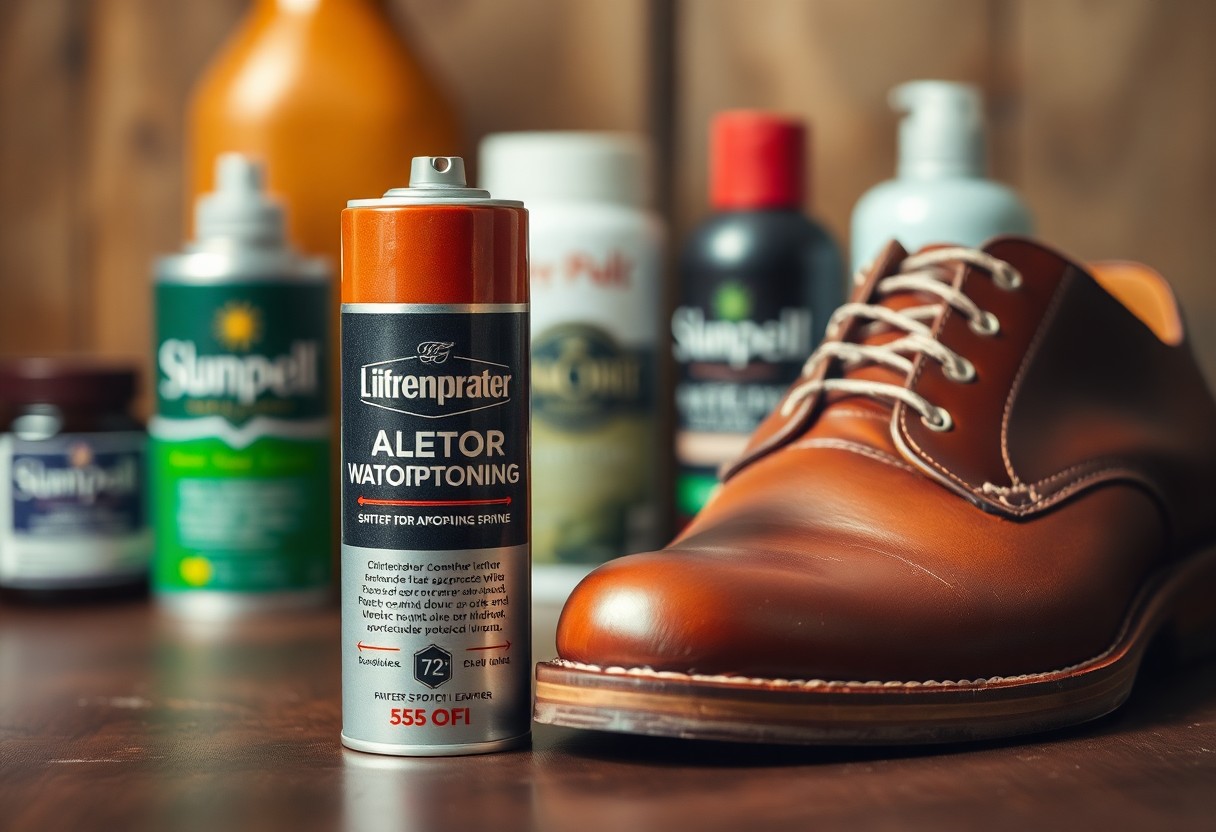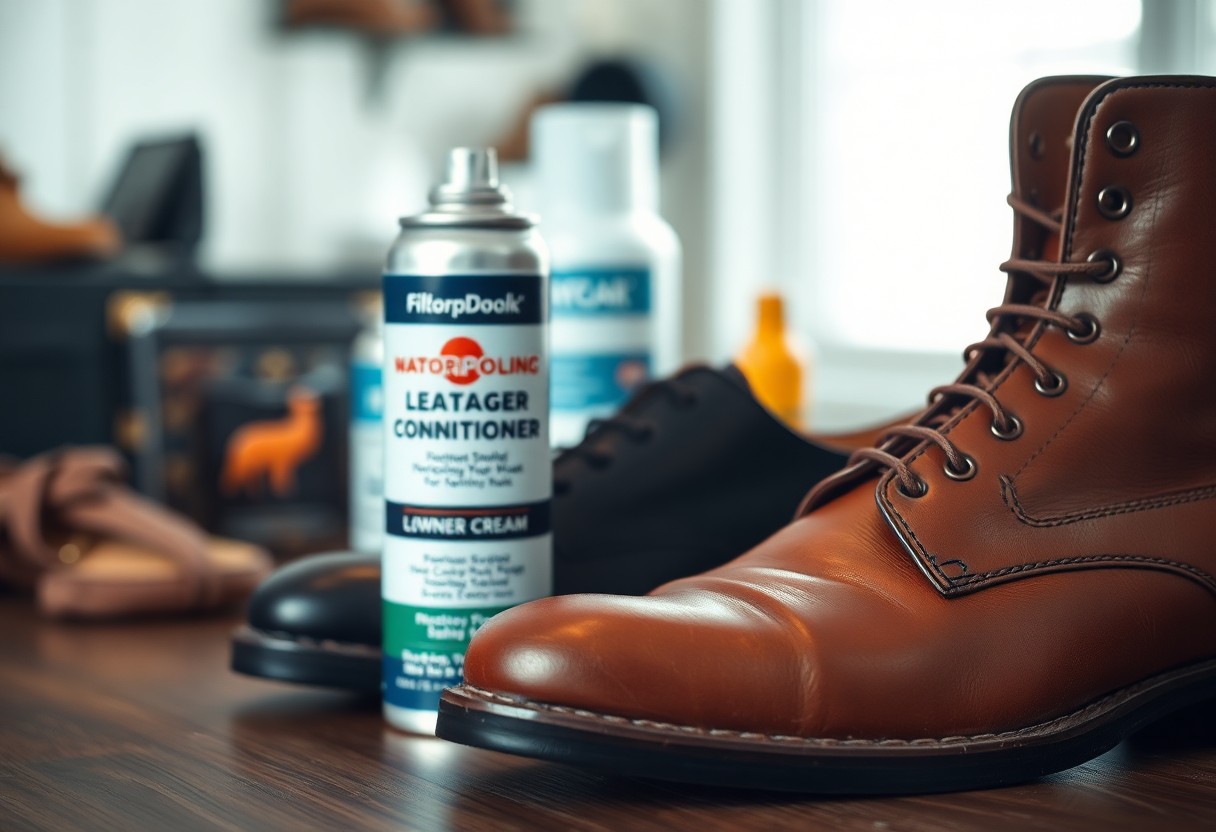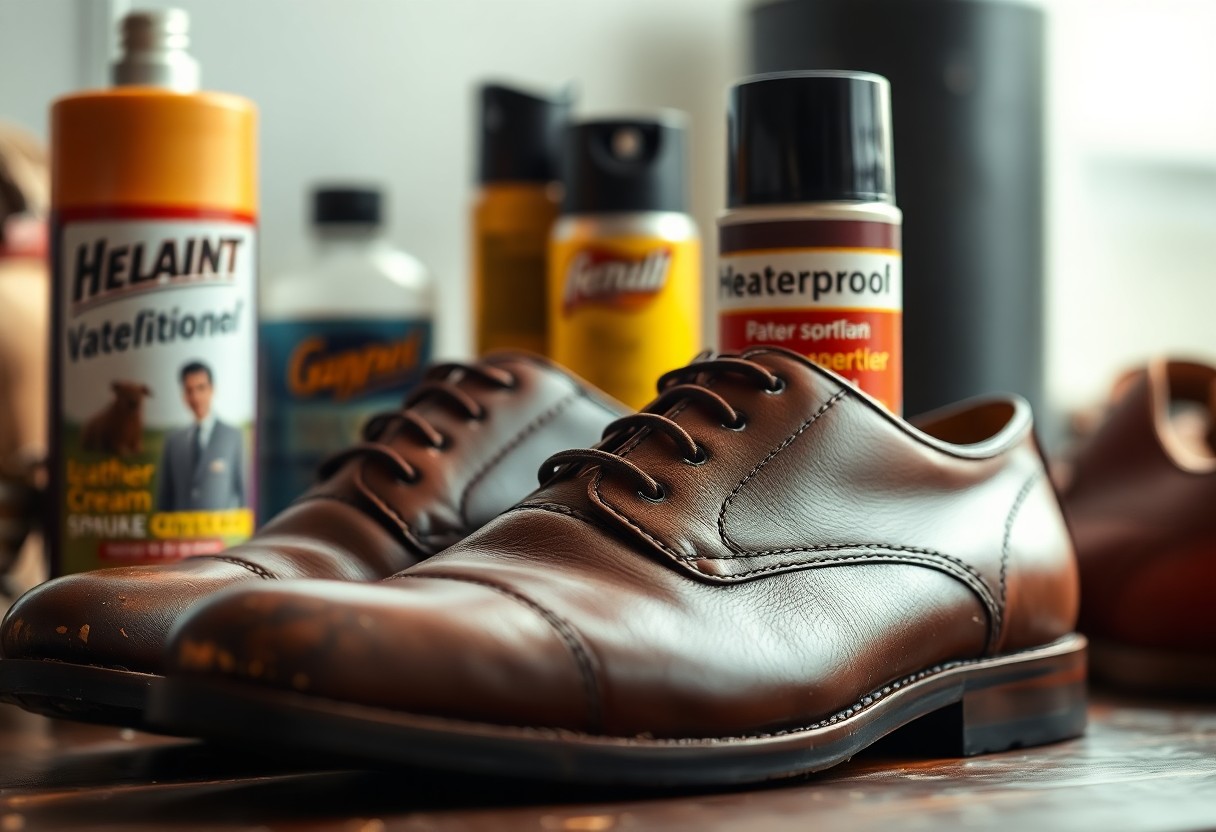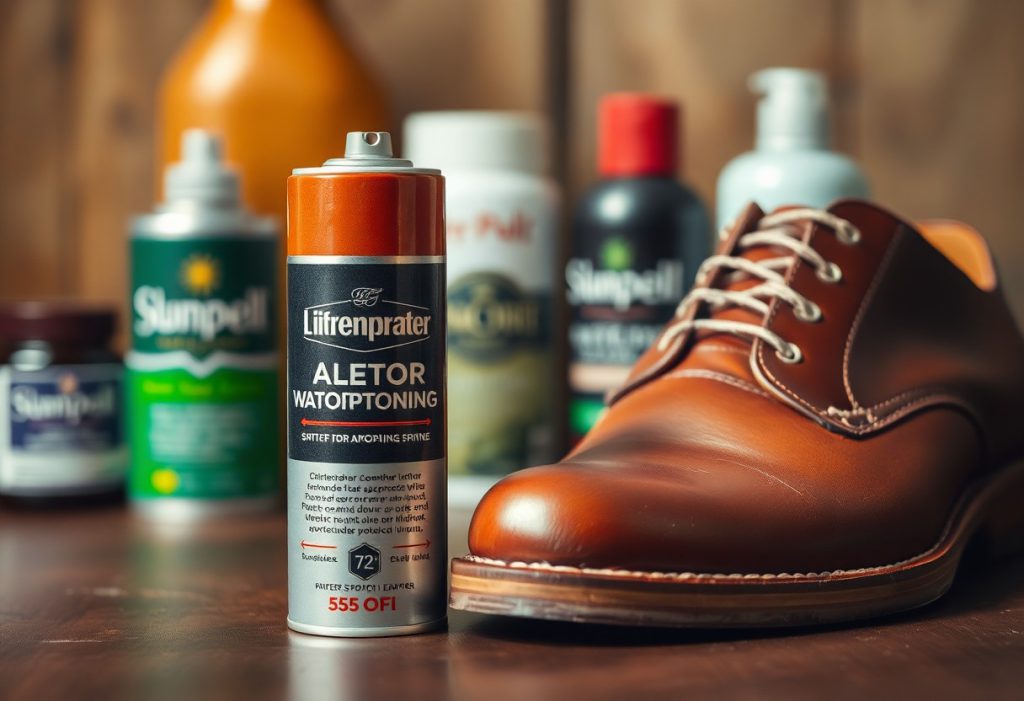Common Leather Care Mistakes to Avoid can lead to permanent damage to your cherished footwear. One prevalent error is using waterproofing sprays on smooth leather. Although these sprays may seem like a simple solution to protect your shoes, they can block vital nutrients from reaching the leather, which ultimately results in dryness and cracks over time. Smooth leather is inherently designed with natural water resistance thanks to its grain layer, but it requires regular nourishment through shoe creams and waxes to maintain its durability and aesthetic appeal. Instead of relying on sprays, opt for high-quality leather conditioners and wax polishes that not only shield the leather but also feed it essential nutrients, promoting longevity and preserving its natural beauty.
Understanding Leather Protection: Essential Strategies for Longevity
To significantly prolong the lifespan of your leather items, grasping their protective characteristics is vital. Full grain leather is equipped with natural water-resistant properties due to its tightly woven fiber structure. However, these attributes necessitate regular and attentive care to remain effective. The longevity of your leather goods is directly linked to the maintenance they receive. The application of waterproofing sprays can hinder the leather’s breathability, potentially leading to severe damage over time if not properly managed. Therefore, understanding the intricacies of leather care is fundamental to preserving its quality.
Discovering the Distinct Advantages of Full Grain Leather
After undergoing the tanning process, full grain leather maintains its original surface layer, which offers unmatched natural protection. Items made from this premium material retain their intact grain layer, providing excellent resistance against water and wear. This top layer is rich in natural oils and fibers that create a protective barrier, making additional waterproofing sprays unnecessary and potentially detrimental to the leather's well-being. Embracing the natural qualities of full grain leather not only enhances its durability but also showcases its refined aesthetic.
Understanding Leather's Moisture Regulation and Aging Process
Grain leather must preserve its capability to absorb and release moisture effectively. The pores within your leather allow it to breathe and manage moisture, keeping the material supple and preventing unsightly cracks from forming. However, the application of waterproofing sprays can seal these pores, limiting crucial airflow and disrupting the natural moisture equilibrium. Furthermore, as leather ages, it necessitates adequate nourishment through conditioning products. When waterproofing sprays are applied, they create a barrier that prevents essential conditioning oils from penetrating the leather, leading to increased dryness and brittleness over time. Consistent application of leather cream allows your leather to mature beautifully, developing a rich and attractive patina.

Understanding the Risks of Using Waterproofing Sprays on Leather
Many individuals mistakenly believe that waterproofing spray serves as the ultimate safeguard for their leather shoes. However, this widespread practice can lead to serious damage to your footwear. While these sprays may create an immediate protective barrier against water, they simultaneously obstruct essential nutrients from reaching the leather, setting the stage for potential long-term deterioration. Recognizing the implications of using these sprays is crucial for effective leather care.
Clarifying Common Misconceptions Driven by Marketing Hype
Due to aggressive marketing campaigns and sincere recommendations from shoe store employees, you might be led to think that waterproofing spray is necessary for all types of leather shoes. This misconception has been perpetuated by numerous shoe retailers, primarily because of the high-profit margins and frequent repurchase rates associated with these products. In reality, regular smooth leather possesses natural protective attributes that do not require additional spray-on barriers for effective safeguarding. Understanding this can help you make informed decisions about leather care.
Evaluating Immediate Benefits Against Long-term Consequences
The deterioration of your leather shoes begins when waterproofing sprays create a barrier that prevents essential oils and conditioning agents from penetrating the leather. While you may initially observe an improvement in water resistance, the reality is that your leather gradually becomes dry and brittle without the necessary nourishment it requires. The repercussions of using waterproofing sprays on smooth leather extend beyond superficial protection. Your leather demands regular nourishment to retain its flexibility and durability. When shoe creams and conditioners cannot reach the leather due to the spray barrier, the material risks cracking and deterioration, significantly shortening your shoes’ lifespan. Utilizing natural waxes and proper conditioning methods ensures superior long-term protection while nurturing the leather's overall health.

Exploring the Science Behind Effective Leather Care Techniques
A key aspect of successful leather maintenance involves understanding its molecular structure. The collagen fiber networks within your leather shoes require both protection and nourishment. The products you choose can either coat these fibers or penetrate them. This interaction is essential for the long-term health of your leather footwear, influencing its resilience and appearance over time.
Recognizing the Importance of Regularly Nourishing Leather
It’s crucial to acknowledge that your leather shoes need consistent nourishment to uphold their quality. The natural oils within your leather shoes help prevent cracking and maintain flexibility. Over time, these oils diminish due to wear and exposure to various environmental factors. To protect the leather’s structural integrity, it’s essential to replenish these oils through diligent conditioning practices that keep your footwear looking and feeling its best.
Understanding the Barrier Effects Created by Waterproofing Sprays
A significant downside of waterproofing sprays is their propensity to create a barrier. When applied to smooth leather, these sprays form an impermeable layer that blocks both water and essential nutrients. This barrier inhibits your leather care products from effectively penetrating the surface, leading to a gradual decline in the leather’s quality over time, which can be detrimental to its overall longevity.
The barrier effect of waterproofing sprays creates a problematic cycle for your shoes. While these sprays effectively block water, they also inhibit the absorption of conditioning products that are vital for maintaining the leather's health. Consequently, the leather may appear protected on the surface, but it is actually becoming dehydrated and brittle underneath. Silicone-based sprays are particularly harmful, forming a long-lasting barrier that is challenging to remove without risking damage to the leather.
Implementing Effective Leather Protection Techniques for Durability
Contrary to popular beliefs, your smooth leather shoes require specific care strategies that align with the natural properties of full-grain leather. The optimal approach combines traditional methods with products designed to enhance the leather’s inherent protective qualities, ensuring both immediate defense and lasting durability for your footwear.
Utilizing the Benefits of Wax-based Solutions for Enhanced Care
An effective alternative to waterproofing sprays is the application of premium wax-based products. These solutions work in harmony with your leather’s natural grain, rather than against it. When you apply wax polish, it creates a protective barrier that still allows the leather to breathe, making it especially beneficial for toe caps and high-wear areas. This method supports the leather's longevity while providing effective moisture protection.
Improving Leather Quality Through Regular Cream and Conditioner Application
Unlike conventional spray treatments, leather creams and conditioners offer essential nourishment while preserving the leather’s natural protective capabilities. Your shoes benefit from oils that deeply penetrate the material, preventing it from drying out and cracking. Furthermore, consistent application of cream and conditioner produces a cumulative effect that enhances leather quality over time. The natural oils found in these products strengthen the leather’s flexibility and resilience, allowing it to develop a beautiful patina that adds character and charm. It is advisable to apply these products every 4-6 wears to maintain optimal leather condition.

Understanding the Appropriate Use of Waterproofing Sprays
In contrast to smooth leather, certain materials greatly benefit from waterproofing sprays. These products effectively create a water-resistant barrier on specific materials that lack inherent protection. Waterproofing sprays are particularly useful for suede, nubuck, and various textiles, where the material structure does not provide natural moisture resistance. Identifying when and how to use these products is crucial for effective footwear care.
Enhancing Suede and Nubuck with Waterproofing Spray for Protection
By treating your suede or nubuck footwear with waterproofing spray, you significantly boost their resistance to moisture damage. While many contemporary suede materials come pre-treated with factory waterproofing, adding extra protection can help maintain this defense over time. The application of spray creates a protective barrier that effectively prevents water from penetrating these delicate materials, ensuring their longevity and aesthetic appeal.
Ensuring Proper Protection for Textile Footwear Against Water Damage
In addition to leather alternatives, textile footwear requires specialized protection against water damage. Materials such as canvas, mesh, and synthetic fabrics can achieve improved water resistance through appropriate spray application. Most textile materials are naturally absorbent, making them vulnerable to water damage and staining. Utilizing waterproofing sprays designed specifically for textiles helps retain the shape and color of your shoes. The barrier they create also prevents dirt and debris from embedding themselves into the fabric fibers. It is advisable to reapply the spray every 3-4 months for optimal protection, depending on the frequency of use and prevailing weather conditions.
Professional Insights and Recommendations for Optimal Leather Care
Not all leather treatments yield the same results. Experts in leather care strongly advise against using waterproofing sprays on smooth leather. Your full-grain leather shoes necessitate specialized care that allows them to breathe and absorb nourishing treatments effectively. Using inappropriate products can lead to leather damage that could cost you hundreds of dollars, making it crucial to invest in the right care solutions.
Expert Advice from Tannery Specialists on Leather Maintenance
To uphold the quality of leather, tannery specialists emphasize that full-grain leather naturally possesses water-resistant properties in its outer layer. Protecting the leather’s natural qualities requires the application of oils and waxes. Waterproofing sprays can obstruct these essential treatments from penetrating the leather, compromising its integrity and longevity.
Professional Cobblers’ Recommendations for Extending Leather Lifespan
For long-term leather care, professional cobblers advocate for the use of wax-based products instead of waterproofing sprays. Your shoes will flourish with treatments that both safeguard and nourish the leather. Data reveals that 90% of premature leather damage results from using incorrect care products, underscoring the importance of following proper maintenance practices.
By adhering to effective leather care techniques, your shoes could have an impressive lifespan of 15-20 years, as opposed to just 2-3 years when subjected to improper maintenance. Traditional wax treatments allow leather to retain its natural qualities while providing adequate moisture protection. Your investment in high-quality leather footwear deserves careful attention to care practices that ensure both aesthetic appeal and durability.
Key Takeaways for Successful Leather Care Practices
In summary, your smooth leather shoes necessitate proper care that avoids waterproofing sprays altogether. Instead, opt for shoe creams and waxes that nourish the leather while providing effective water protection. Full-grain leather inherently boasts natural protective attributes due to its grain layer, and waterproofing sprays may block essential oils from permeating the leather, leading to dryness and cracking. Save waterproofing sprays for suede, nubuck, or textile footwear where they can be most effective. By choosing the right products, you can safeguard your leather shoes while ensuring their longevity and continued beauty.
Your Leather Care Questions Addressed
Q: Why is waterproofing spray detrimental to smooth leather shoes?
A: Waterproofing spray creates a barrier on leather that obstructs essential oils and conditioners from penetrating the material. While it offers water protection, it also prevents the necessary nourishment of the leather, which leads to dryness and potential cracking over time, ultimately reducing the lifespan of the shoes.
Q: What alternatives should I use instead of waterproofing spray on smooth leather shoes?
A: Consider using a blend of shoe cream and wax polish instead. Shoe cream delivers essential oils to nourish the leather, while wax polish forms a protective layer that helps repel water. This method works synergistically with the natural protective qualities of full-grain leather, maintaining the leather’s health while providing effective water resistance.
Q: Which types of footwear can I safely apply waterproofing spray to?
A: Waterproofing spray is suitable for materials such as suede, nubuck, and textiles. These materials lack the natural protection found in smooth leather and thus benefit from the barrier created by waterproofing sprays. Many modern suedes and nubucks may already have factory waterproofing treatments, but additional applications can enhance and sustain this level of protection.
The Article Why you shouldn’t use waterproofing spray on regular smooth leather and better alternatives appeared first on My Shoes Finder
The Article Waterproofing Spray on Smooth Leather: Risks and Alternatives Was Found On https://limitsofstrategy.com
The Article Waterproofing Spray Risks and Alternatives for Smooth Leather First Appeared ON
: https://ad4sc.com



I completely relate to the point about waterproofing sprays! I remember using one on a pair of my favorite dress shoes, thinking I was doing the right thing. But soon enough, I noticed they looked dull and felt much stiffer. It’s such a shame how easily we can overlook the basic needs of leather in our quest for convenience. I’ve since switched to using a good leather cream that not only nourishes but also keeps them looking sharp. It’s a small change, but I feel the difference in both the look and longevity of my shoes. Have any other readers found specific brands or products that work particularly well for conditioning leather? I’d love to hear your experiences!